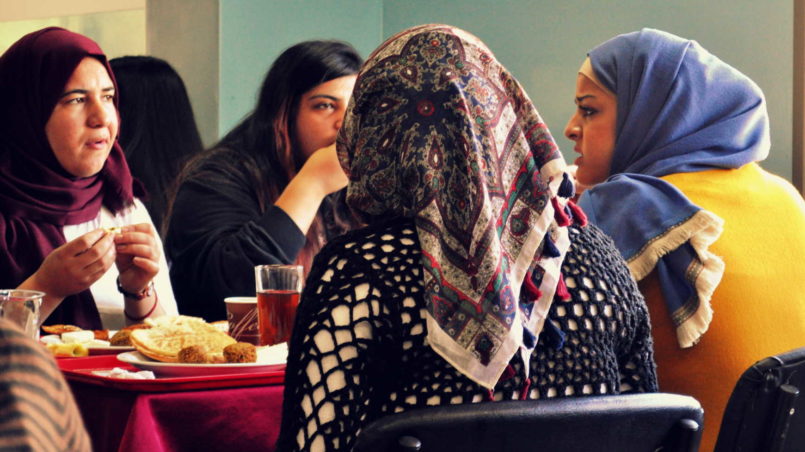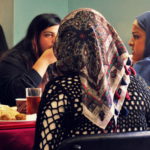Gender Politics in Palestinian Society

Whenever the term oppression is used in the Palestinian context, it invariably denotes oppression carried out by the Israeli military administration on the Palestinian population. Whenever an image of Palestinian suffering is invoked, the picture that comes into our mind is usually without any gender distinction.
The protracted Israel-Palestine conflict had undeniably grabbed all the attention and energy, leaving very little room to focus on internal Palestinian political and social issues. All efforts and energy are directed to the national struggle, overlooking various internal issues which need to be addressed. In fact it can be said that everything else has been relegated as peripheral.
This concern was voiced by many Palestinian participants in the youth camp.
However, a discussion organized in the camp to raise various issues concerning the national struggle ended up in a discussion of gender politics and oppression as well as other internal problems. Such deviation was, however, not entertained by the organizers and finally the subject of national struggle was again brought up. But the concerns raised by some of the Palestinian participants made me conscious of how the whole issue of national struggle is always masculinized and prioritized, while issues related to gender oppression and injustice are made irrelevant and slighted. I was intrigued to know that gender issues are not only considered peripheral but dismissed altogether as unimportant at this stage of Palestinian struggle.
Palestinian society is a patriarchal society like all other Arab societies. Notions of honor and shame are critically important in their worldview as well as in their understanding of their own identity and conduct in life. Honor is a male prerogative while the loss of honor is considered to be always dependent on women’s behavior. Loss of honor brings shame to the whole family, and it is only women’s behavior and moral conduct that can lead to shame. Such notions and such a belief system might be viewed as particular to Arab society and thus reprimanded. However, such notions can be found to exist in more or less every society around the world to different degrees.
While we were travelling back from Jerusalem to Jericho, we were introduced to a Palestinian woman, who is a women’s rights activist. She was a friend of one of the camp organizers and so came to meet the participants and share her experiences. The concerns she raised were critically important for a nation that is in the process of the making.
She told us about her life and the way she has to struggle to live a dignified life.
She further told us that many Palestinian women are subjected to such humiliating experiences at home. But few summon the courage to choose to walk away. Patriarchy is deeply entrenched in Palestinian society and so independent behavior of women is rarely tolerated. Moreover males are considered the custodian of the family honor and are considered superior to women in every aspect. In fact, women are always expected to behave in a particular way in public and too much interaction with males is considered immodest. Such a belief system leads to many different forms of discrimination against women in Palestinian society.
I was not completely unaware of this situation for women in Palestinian society. I had earlier read about these issues in books as well. Interaction with a Palestinian delegation of nationalist poets and filmmakers that visited India confirmed the presence and escalation of violence against women.
That is the only area in which they can assert their domination and control, which they have almost lost under occupation. However, when I visited Palestine, it became increasingly difficult for me to comprehend and appreciate the complexity of the gender issue.
I observed that segregation of male and female spaces and roles in Palestinian society do exist but is less sharp than that which exists in other Arab societies. Male and female participants of the youth camp were provided accommodation in entirely different campuses. Boys were not allowed in the girls’ campus and vice versa. However, such segregation was not evident when we were travelling by bus. Palestinian girls and boys sat together, danced together and enjoyed each other’s company.
Thus one cannot explicitly see and outrightly claim the gender divide and oppression that is entrenched in Palestinian society. In fact, many forms of oppression against women are justified as necessary for the national struggle. For instance, fertility is accorded great importance by Palestinians as a political tool. This is understandable in the Israeli-Palestinian context, as population growth is quite relevant for survival as a community. The fertility rate is quite high amongst both Israelis and Palestinians.
But one need not see Palestinian women as weak and docile. Every Palestinian women I met in Palestine was impressively perceptive. They had good understanding of the political situation and had clear cut opinions regarding the way the national struggle should be taken forward. They are strong and daring. They have seen their families tortured and humiliated by the IDF. Palestinian mothers have seen their children been killed in front of them. But they don’t give up and stand strong against the occupying forces.
They have sacrificed their sons for the nationalist struggle. They have been toiling to contribute to the struggle for liberation. They do not sit at home but actively participate in the resistance activities and politics. In fact, Palestinian women have been taken up important leadership roles in the nationalist struggle since the conflict started. Every Palestinian girl is trained mentally if not physically to fight for the nation.
Every society has numerous internal issues. But they need to be addressed and gradually solved rather than being relegated and ignored as unimportant.
Credits
| Image | Title | Author | License |
|---|---|---|---|
 |
Gender Politics in Palestinian Society | Sumana Singha | CC BY-SA 4.0 |
